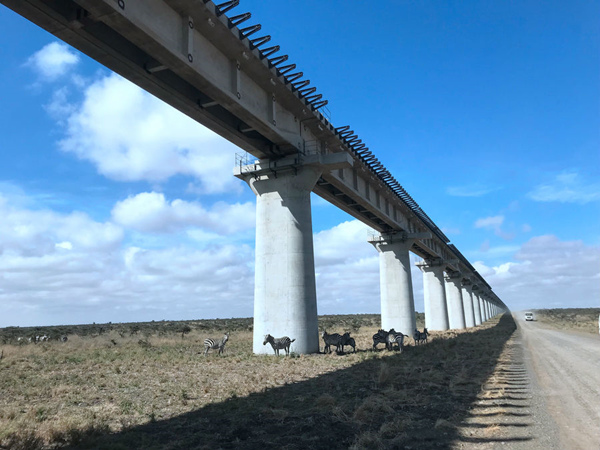Nairobi-Malaba Railway Boosts Development in East Africa
In January 2018, China Communications Construction Company Limited (CCCC) started building the Nairobi-Malaba Railway in Kenya, East Africa.
The railway is a further extension of the Mombasa-Nairobi Railway. Starting from Nairobi, the railway goes toward the northwest, passes through several districts such as Naivasha and Kisumu, and ends at Malabar, a border town between Kenya and Uganda.
A key part of the East African railway network, the railway has a length of 487.5 kilometers and first-class standards, with a designed speed of 120 kilometers per hour.
After completion, the East African region will be interconnected and the railway will become one of the benchmark projects for China's Belt and Road Initiative.
The Nairobi-Malaba Railway construction has more than 26,000 local workers, or about 90 percent of all employees in the area.
CCCC also cooperated with more than 400 local material suppliers and hundreds of engineering companies to create more than 20,000 jobs.
Local people who had suffered from poverty are thankful for the changes brought by the Belt and Road Initiative in their lives.
The construction of Nairobi-Malaba Railway not only brought Chinese standards and technologies to the area, but also provided local suppliers with advanced technologies, management and assets and largely promoted the development of industries such as cement, steel and transportation.
The first phase of the Nairobi-Malaba Railway is entirely constructed by Chinese standards. It has a total length of 120 kilometers and passes through the Great Rift Valley fault zone in East Africa.
Complex geological conditions require the railway to be earthquake-proof. However, Kenya's local steel producers are not able to produce earthquake-proof rebar that meets Chinese standards. Therefore, the earthquake-proof rebar must be imported from China, which is both costly and time-consuming and puts the project in a dilemma.
"It is very difficult for the local companies to produce qualified rebar despite the huge market demand. Therefore, we have tried hard to upgrade local industries," said Liu Zhenchao, manager of the Materials and Equipment Department of the project.
Liu shared his idea with Wang Yong, director of the project's laboratory center. They reached an agreement and as a result the project department confirmed preliminary cooperation with a strong local company, Prem Steel.
However, Prime Steel did not have enough confidence to provide such high-quality steel. The project's laboratory center dispatched technical experts to help Prime Steel conduct necessary research and exploration.
The production process is not going smoothly. When the first batch of rebar samples were sent to the laboratory center for testing, most samples were unqualified. After detailed comparison and analysis, the technicians found problems in the rolling process.
In order to overcome the difficulties of rolling, Chinese technicians spent a long time discussing with the technical team of Prem Steel. They also invited domestic experts to help Prem Steel upgrade the process. With the joint efforts of the Chinese and Kenyan technical staff, Prime Steel was finally able to stably produce earthquake-proof rebar that meets Chinese standards.
"Since we can produce earthquake-proof rebar, other Chinese companies also began to contact Prem Steel to purchase local qualified rebar," said Modak, general manager of the marketing department of Prem Steel.
In the town of Tula, Kenya, Anita runs a small bar. Although the bar can only accommodate 30 people, it is popular in the local area.
"I inherited the bar from my parents, though I worked hard, it was difficult to keep the business going due to a limited customer base. However, with the construction of the Nairobi-Malaba Railway, things changed."
A large number of local employees came to Tula for railway construction, and Anita's bar thus began to flourish.
"At the beginning, only local workers who worked on the construction site came to my bar. Later, many Chinese people also came," Anita said with a smile. In her eyes, her bar has become an international hotel.
At the end of the month, Anita's bar was full every day, and even the chairs were placed on the street. Recently, Anita opened a clothing store. "Because of the profits earned from my bar, I can have a new store," she said with satisfaction.
Isaac is another local resident who has benefited a lot from the construction of the railway.
He runs a hotel in Tula, which before only had visitors on weekends. Now Isaac has transformed the hotel into a rented house to accommodate local workers. The monthly rental income is as much as the previous year's.
Alang, a young man from Kenya, was born in 1990. He is not only a technical expert, but also the only employee who won the Warrior Award issued by the Office of the President of Kenya during the construction of the Nairobi-Malaba and Mombasa-Nairobi Railway.
As the first technician independently cultivated by the project department, Alang can use Chinese operating system skillfully and can independently complete the coagulation and mixing work.
In 2011, he was admitted to the university to study tourism as well as Chinese and French.
The construction of the first phase of the Nairobi-Malaba Railway brought new hope to Alang.
With fluent Chinese, he successfully joined the project department. Starting from safety training and other basic work, he stood out among the local workers and began to do technical jobs and then became a concrete mixing station operator.
The highly informative and intelligent production process under the CCCC has helped him to grow rapidly. He quickly became familiar with the station operation process and quality control system.
In the summer of 2017, Alang was recommended by the project department to participate in a short-term training course for railway construction at Southwest Jiaotong University.
In the training, he learned about the system integration capability and the refined and professional management capabilities of the Chinese railway industry. Alang realized there is still a long way to go. Fortunately, he is already on a leading track and he hopes to know how to run a mixing station in the future.
There is a saying in Africa that "If you want to go far, you have to go along with others." The Nairobi-Malaba Railway carries local people's pursuit for a better life, boosts their spirit, and helps East Africa to lead in accelerating the pace on the road of development.

The Nairobi-Malaba Railway in Kenya [Photo/sasac.gov.cn]
(Executive editor: Li Shuling)



